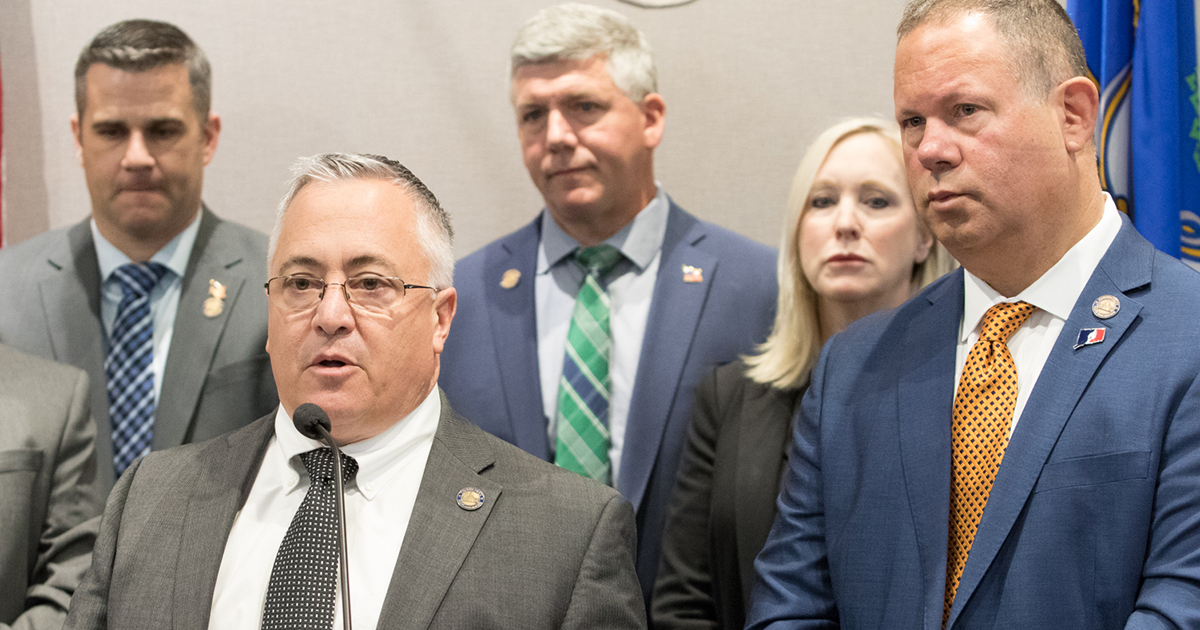


HARTFORD—House Republicans on Friday called for the legislature’s Judiciary Committee to hold a public hearing on a proposed amendment to the Connecticut Practice Book regulation that specifies the percentage of police or court-set bond an individual must pay to free themselves from jail while their criminal cases are pending.
On May 8, the Rules Committee of the Superior Court held a public hearing on an amendment to CT Practice Book section 38-8 (Ten Percent Cash Bail) that would increase the maximum limit of bonds that can be posted through the court clerk’s office to $50,000 from $20,000 while also lowering the percentage the individual would be required to pay to seven percent from 10 percent. Rules Committee members voted to advance the amendment the same day.
“This is no small change, and it carries considerable public safety implications for Connecticut residents—victims in particular,” said House Republican Leader Vincent Candelora, who, with state Rep. Patrick Callahan (R-New Fairfield), submitted testimony to the Judicial Branch in opposition of the proposed Practice Book amendment. “With that in mind, we believe it’s not only imperative for the General Assembly’s Judiciary Committee to hold a public hearing, we contend it’s required.”
The CT Practice Book contains rules for the professional conduct for attorneys, rules for the Superior Court, and Rules for Appellate Procedure. Before the proposed amendment can be enshrined in the book, state judges must approve it at their annual meeting next month.
But Rep. Craig Fishbein, citing Connecticut General Statue 51-14b, said the legislature’s Judiciary Committee should meet its obligation before that vote occurs.
“State statute is clear. The rule making process is not discretionary. The public has a right to speak directly with their elected officials, and those officials have the right to debate and vote on any such rules so that everyone in the judicial system—defendants, victims, bondsmen, practitioners, and court employees—understands the expectations and limits,” said Fishbein (R-Wallingford.) “That is the process, and that process should be respected. To do otherwise undermines the public trust and underscores our concerns about non-elected officials overstepping the authority given to them by the legislature.”
Candelora, of North Branford, further added that it’s critical for members of the legislature to pay close attention to statutory obligations that affect committees.
“Another statute, 51-15a, requires Judiciary Committee chairmen to appoint a group of six committee members to meet with the Superior Court’s Rules Committee at least once a year to discuss a variety of issues, yet to my knowledge that’s not something which has happened,” Candelora said. “Unfortunately, it feels as though our process is devolving into one where the majority party conducts business the way it sees fit rather than what’s specified in statute. How can anyone expect the public to follow what’s happening inside public institutions if the people running them operate from their own script?”
STATUTORY REFERENCES:
Sec. 51-14(b) All statutes relating to pleading, practice and procedure in existence on July 1, 1957, shall be deemed to be rules of court and shall remain in effect as such only until modified, superseded or suspended by rules adopted and promulgated by the judges of the Supreme Court or the Superior Court pursuant to the provisions of this section. The Chief Justice shall report any such rules to the General Assembly for study at the beginning of each regular session. Such rules shall be referred by the speaker of the House or by the president of the Senate to the judiciary committee for its consideration and such committee shall schedule hearings thereon. Any rule or any part thereof disapproved by the General Assembly by resolution shall be void and of no effect and a copy of such resolution shall thereafter be published once in the Connecticut Law Journal.
Sec. 51-15a Consultation between judiciary committee and rules committee of Superior Court. The Senate and House chairmen of the joint standing committee on judiciary shall appoint six persons from among the members of the committee who, with the chairmen, shall meet, on the call of the Chief Justice, but not less frequently than annually, with the rules committee of the Superior Court to confer and consult with respect to the rules of practice, pleadings, forms and procedure for all courts of record of this state and with respect to legislation affecting the courts pending before or to be introduced in the General Assembly.
